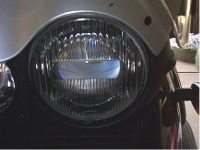Here is some information on HID light bulbs and HID light conversions from Bill Finch of SOL Lamps.
SOL Lamps sells an HID headlight conversion kit that can be used on motorcycles.
UPDATE: The SOL Lamps website is not operational as of August 24, 2006.
The H4 kit we sell uses the regular old H4 lamp base. As you know, HID lamps are “wired” and do not contain the contact and electrical connections for so called, “plug and play” fitment. Plug and play seems to refer to automobiles, not motorcycles.
SOL LAMP kits do not use the plastic connector design at the rear of the HID lamp for connection as do some of the so called “universal” styles that resellers refer to as “plug and play”. These rear connector lamp styles do not provide the seal needed for keeping moisture out of the headlamp assembly.
One item to be aware of when selecting a HID kit is the adherence by the lamp manufacturer to the focus center dimension. Headlight optics are designed to use lamps whose focus center is strictly defined. If the HID lamp arc chamber is not in this “sweet spot”, the HID installation will not perform well.
Here are some comments regarding wiring needs for HID installation:
Many motorcycles, ATVs and other vehicles with limited battery capacity use a relay to distribute electrical load. When the starter button is engaged, this relay sheds as much electrical load as possible to provide maximum battery current for turning the starter motor.

As the starter button is released, the relay reengages the load shed during starter operation. This load shedding relay typically has robust contacts for the headlight circuit.
On my BMW, I have not been able to ascertain the load rating of these contacts but, they are likely rated for about 15 amps, a bit more than the total load of both the low and high beam (if the rider happened to leave the high beam switch in the on position at shut off).
At strike, the HID diode multiplier circuit in the igniter begins to build voltage to strike the arc in the lamps arc chamber. The current draw of this circuit in the HID system varies widely depending on the ballast and igniter design.
The ballast/igniter design used by SOL LAMPS does not exceed 10.5 amps @ 13.2VDC at strike. It is likely that a separate relay to carry the HID system load is unnecessary.
Also, there are some subtle things going on at lamp strike in the ballast/igniter circuit. The capacitors charge at some time constant (speak to your EE about capacitor time constants). This means that the load is seen as a “capacitive load” not a “resistive load”. The capacitive load is a gentle load.
Capacitors are often used to “soften” the load on switch contacts, relay contacts and ignition points (remember those). The SOL LAMPS ballast/igniter design provides this soft load to the load shed relay contacts.
With motorcycles which have the load shed function designed into the ECM or on-board computer, the capacity of this solid state switch must be ascertained so as not to overload it (ECMs are a bit more expensive that mechanical relays).
Remember also, a battery in good condition (high internal resistance), fully charged is the best guard against overloading relays, switches and computer switching circuits.
Also, please note, SOL HID kits use a separate ballast and igniter. There is good reason for this; the igniter produces very high AC voltage at strike (23,000 volts). This voltage needs special insulation and isolation than can be provided inside the already cramped ballast.
This means better reliability but does increase the challenge of the motorcycle installation, especially on naked bikes and cruisers. I am currently testing a all-in-one ballast/igniter but, it will not be ready for release this year.
In closing, the Phillips and Hella ballasts are good products but, they are designed for cars. They do not take into account battery capacity limitations of motorcycles and they are designed with connectors which are automotive oriented.
You’ll notice the connectors on the SOL LAMPS HID kits are fully waterproofed with sturdy over molds and heavy insulation.
Let me know how I can assist your visitors.
Best regards,
Dennis Finch
Publication Date: 2005?


